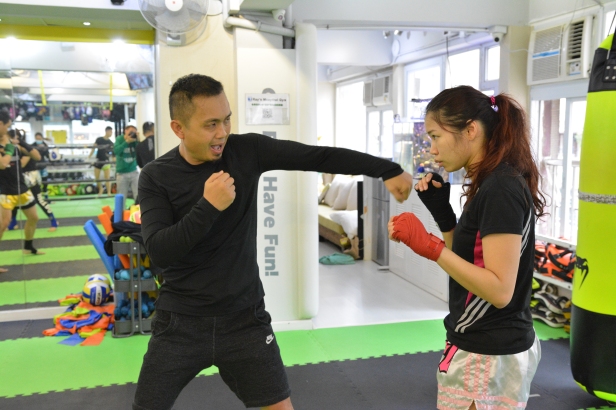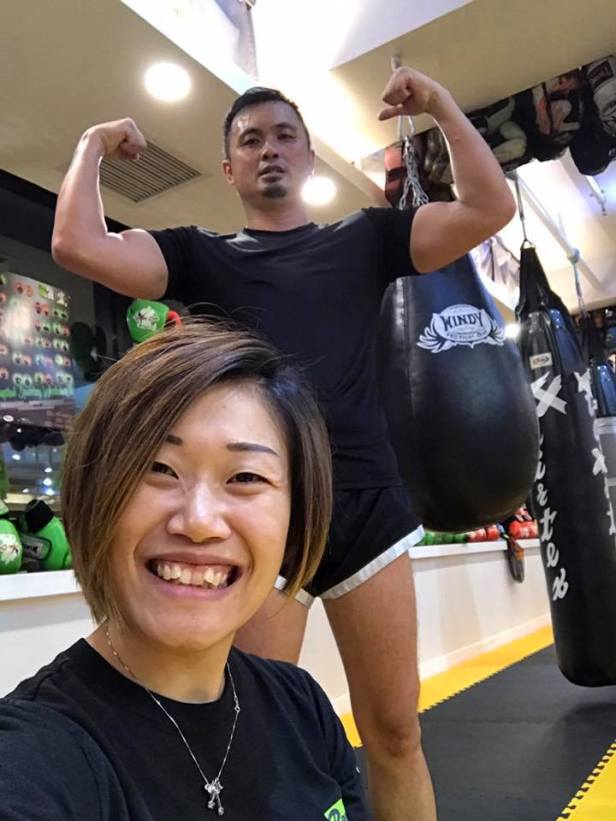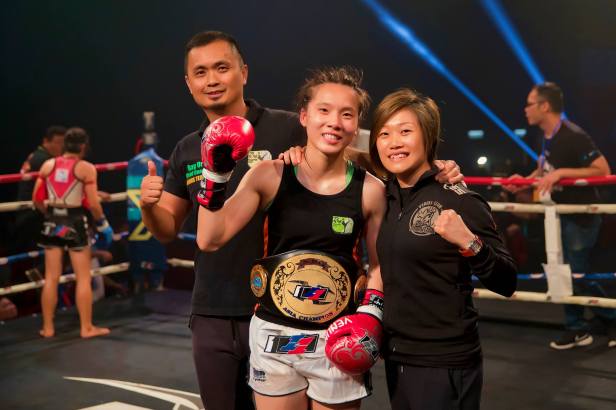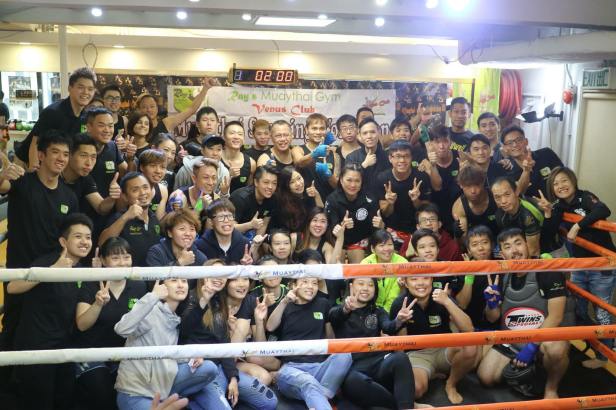Last week we got to read about Ray’s humble beginnings as a martial artist and how he cultivated his techniques bit by bit. This week, we talk about his teaching methods and explore how he passes on these valuable gems to his students.
How did you come up with the name 剛嵐?
This was actually Ng Kam Hung Sifu’s old gym name, named after his son, Ng Kong Nam (伍剛嵐). Sifu actually told me to change it on various occasions, but I insisted to keep it out of respects for him.
Injury is part of training. Would you agree?
Definitely. In fact, I think stronger people get injured more often. Not because they are constantly trying to injure themselves, but because when they try to push their limits and boundaries, it is more likely that they do come across injury at some point or another.
I believe that as a competitor, it’s common that you will have injuries when you compete. One may even say, if you don’t have injuries, perhaps you didn’t train hard enough.
I think injuries train your heart too. It opens the opportunity for you to train your other weapons when you can’t use your normal ones. I have plenty of examples of this and many of my fighters still competed and won.
How do you train your student’s mentality?
I like to induce my students to think. In fact, I feel that it is the core of my teaching. I believe that all techniques stem from the thought about it.
I feel that a lot of fighters are imprisoned by their own techniques because they feel that they must execute the identical move that their masters taught them. I like to tell my students the characteristics of certain moves to help them break down how and when to use it. Whether they choose to incorporate it in their game is then totally up to them.
On the other hand, I encourage my students to always think by doing a lot of mental exercises and by always asking them questions. I feel that if they can answer the questions for themselves, they would have thoroughly understood the technique and made that technique their own.
For example, a simple example of a jab, cross, hook, right kick – can be thrown into the air with no adjustments. However, may simply change the variables of angle of attack and footwork –and the whole combination may drastically change into a possible combination of jab to body, straight to the nose, step diagonally to your left into a left hook thus preventing the opponent to change angles into a low right kick to the adjusting feet of the opponent.
Sometimes, my students will also be mentally afraid to fight a certain opponent of their records. I would tell them that if the results of a matchup were solely based on the determining factors of records and stats, there would be no need to fight at all!
How would you prioritize these qualities in terms for a fighter: stamina, technique, strength, speed, precision, and distance management?
I would add one more criteria – damage. I would rank then them in this order: damage, stamina, technique, distance management, speed and strength.
As for precision, I feel that everybody has precision – name someone who can’t hit focus mitts. Everyone can do that! The real question is purpose – how one can hit certain targets in real combat. I believe that a good striker always has purpose and intent behind his strikes.

What exercises do you think are a must for competitive training?
Stamina training is a must because it not only trains your cardiovascular system but also your will to fight. You will also need lots of sparring and opportunities to test your skills in real combat.
How do you motivate your students?
Everyone is different. Shouting at them is certainly one way, but most of the time, I choose to talk with them. I like to share my stories and history with them to tell them that nothing is impossible.
When they feel demoralized and non-confident, I would ask them if they had ever thought of their present self three years ago. Most would have never imaged they would become the successful person they are now. Hence, it is only logical that sometimes, it may difficult to imagine a better future self! The real question was whether they wanted to change.
On another occasion, Candy had faced an opponent in Thailand that it was impossible for her to win. Her opponent’s close range attacks were pitch perfect! Everyone who got close to her would be taken down. It was no different for Candy, and in their first round, Candy had lost bitterly on points. Suddenly, it dawned me that if I always told my students to win, they would sometimes feel that it was impossible due to the technique difference. By always trying to win, they would constantly under a lot of stress.
That was when I told her that she would lose for sure, and that her job was to try not to lose too much. Her attitude changed in an instant. In the next round she focused on keeping her opponent at range and prevented her from easily going into close range. One of judges even gave that round to Candy.
Candy lost the fight in the end, but winning that second round against an opponent which was impossible to beat made her very happy.
From this experience, I realized that sometimes telling my student not to lose too much was also a viable strategy for changing attitude, but also because it was possible of us to also reverse the points in the last round. For example, if I were to fight Buakaw today, I would lose for sure. But if my job to win my former self, and all I had to do was to survive all three rounds, it would be totally a different story.
I think the way I motivate my students is similar to how I like to teach my students, I do not have a set method – some students require scolding, some students require insulting, some require confident boosters, some require praise.
I remember one time Venus me not to scold her with vulgarities because it make her heart break. The next day, I praised her instead and she was exuberant. I then realized that sometimes, students really care about how you view them.

What qualities do you look for in a student?
I think the first thing I search for I look when I teach a student is how they look at their targets. If they view the heavy bag with no soul, I normally don’t really talk to the student.
On the other hand, if the student’s glare on the heavy bag had a soul and purpose, I would be very happy to teach them.
I also observe whether the student thinks about their techniques after class. If they do not, I will seldom teach them voluntarily. I teach not out of interest or money, but to continue my master’s will – to teach those who want to really learn Thai Boxing.
They will of course have to trust me as well. If they don’t trust me, it will be very hard for me to teach.
I have developed intense trust between my students – especially with Venus. Normally, when fighters fight, you will find that most people will first listen to what you say, process whether or not they should use your information before actually going through with it.
On one occasion when Venus was fighting a Thai girl, I had noticed her opponent placed her left hand down whenever she blocked a low kick. At some point, I yelled “low kick, high…”, and before I could even finish my sentence, Venus had already executed the two kicks. There was massive applause amongst the audience for the beautiful of the move she had just executed. There was zero hesitation from Venus and for the first time I felt total trust from my students.
Perhaps it is that trust she put in me, that I also entrusted her with a brand new gym for her to manage.

What is your philosophy of coaching and its relationship to education?
When a student finally becomes my disciple and not my customer, I give them more advice on their everyday life than on their actual technique.
Based on their trust towards me, I try to shape them into a better person.
I remember I used to have a particularly naughty student who once fought in school ended up being taken to the police station. He had watched a TV show and wanted to compete.
I told him, if he could achieve better scores than his previous exams, I would teach him more about Thai boxing. I would occasionally come to the gym on Sundays to teach him even when there was no class, because that was the only free time he had.
In the end, he graduated from University.
In fact, Candy and Ling were pretty much delinquents too, they would skip school all the time. When they finally finished studying, they didn’t look for jobs either. In the end, I told them they could either find a job or go back to school, otherwise they were not allowed to come back to train.
Gradually, I felt their technique improve and asked them to try to compete. At first, they would even ask me if I really thought they were prepared. I told them, “Honestly, I don’t really think you’re prepared, but I’m just giving you a goal in life. It certainly beats wonderingly endlessly for the rest of your life, right?”
When Candy fought for her first belt, her entire family came to support her and when she won, her entire family was very proud of her.
I could see her evolving, it was beautiful. In the past, when I told her to do something, she would always reply me, “But Ray! I’m not prepared for that!” Nowadays, she would reply me, “I will try my best”. I try to teach my students that with hard work and dedication, nothing is impossible.
I always tell my students, Muay Thai can be just any other event in your life, like watching a movie – when you finish watching it, you just carry on with your normal life – but if you are serious about it and allow it to becoming a pivotal point in your life, it will completely change you as a person.
I really love teaching because of the change I have brought to people.

How do you set out the training program for your competing students?
The basics I teach are all the same. But whenever a student seeks to compete, I will give them more technique so that they can choose which type suits them the best. I will give them pointers on how to fight based on their character and size. For example, the way Yu, Ling, Venus and Candy kicks are totally different.
For example, Venus is rather small in size, so if she were to fight a much larger charging opponent, the probability she would lose in brute strength would be high. That’s why I taught her how to be more agile on her feet and that’s why her slips and ducks are faster than other fighters.
On the other hand, Candy cannot perform a large amount of slips and ducks without sacrificing a portion of her punching power. Her style is therefore more focused on speed and blitzes.
Yu is a stubborn person, so whenever I teach her, I water down to very stubborn methods as well!
Your gym has a wonderful gym atmosphere, what kind of efforts have you put in to create this?
I’ve never particularly put in any effort. I just purely love teaching. When I teach though, I’m often agitated with myself, because I take it as though I’m fighting myself. I guess that’s how the atmosphere is created.
When I try to explain a certain technique, a lot of my students stop and listen to me even though I wasn’t explaining the technique directly to them. They tell me, they feel like I really need them to know about it.
I will often get mad at myself when my student can’t perform a certain technique as well. Sometimes, I really want them to understand how to execute a certain technique.
That’s why I try to use personalized methods whilst teaching. Even for the aunties who come to keep fit.
Often, when they can’t get the technique right, I will explain to them that proper mechanics and movement would help them slim specific muscle groups, they would then make correct immediate adjustments.
I guess it’s kind of like when we were back in school, there were a lot of teachers who just read from textbooks in monotone. It would be boring and you would learn nothing, but he was doing his job – just not a great job. However, some teachers would bring the text to life, and tell a vivid story to draw your attention, those were the great teachers.
To be honest, my student’s win or loss in competition doesn’t really annoy me. Their win or loss will not make me more well-known. Rather, I just want them to perform to their optimal potential.

A common phenomenon in HK is that when a person succeeds in gaining fame through competition, they tend to open their own gym. In Venus’ case, your excellent relationship with her seem to have enabled her not to leave but also partner with you in your gym businesses. How did that come about?
I think it’s because I really care about her future.
I told Venus that she couldn’t be a competitor her entire life. That’s why I really wanted her to become a good coach. When you become a coach, you will gradually learn how to take care of others. When you learn to take care of others, you will learn how to improve yourself.
Normally, when you are capable to perform some tasks, you never think of why. But to allow your student to perform the same, you will think more complex methods and ways to allow them to perform the same.
I taught her step by step how to run a gym. What she ought to do and what not. But I particularly don’t want her to follow my footsteps because by imitating me, she can only be an imitation of me. If I really cared for Venus, I wouldn’t want her to be just an imitation.
I always tell my coaches, the coaches in Ray’s Muay Thai Gym is probably not the best coaching team Hong Kong can offer – a lot of them are not champions or even not a lot of them have competed that much, but I am sure that we are Hong Kong’s most united coach team in spirit. I believe they all of the same spirit and vision as me. Perhaps that is the reason why I have insisted not to employ any Thai people.
What has been the most difficult problem you have encountered when teaching?
I think the most difficult problem revolves around trust. I believe a person’s trust is held by a very thin line. Sometimes some of your students will never listen to you when they go and compete.
I think a lot of fighters have experienced this. The corner man yelled until his lungs burst to throw a right cross, but the fighter just wouldn’t throw it. This is part of distrust.
There was one time Yu was sparring with another male student of mine and was losing on points. I had told her to throw her uppercut, knowing that her uppercuts were without strength. In the end, she won in points because after throwing the uppercuts, her opponent couldn’t hit her.
After the spar, she asked me why – and I told her, sometimes, your punches don’t need to have a lot of strength, because he was always rushing in with his chin down ready to trade one twos. That’s why the uppercut had annoyed him enough to make him turn his head back up for a split second – and that’s where I wanted it to be.
Next week, in the final part of his interview, read more on Ray’s views on competition, his largest challenge and his fears.
